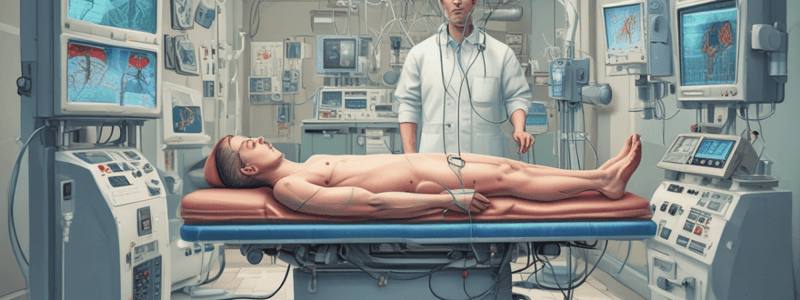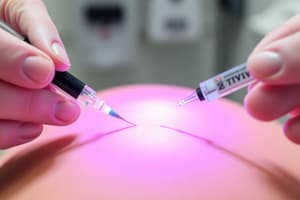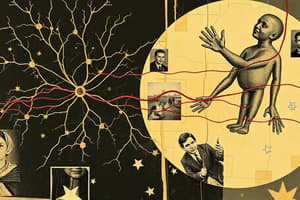Podcast
Questions and Answers
What is the primary mechanism by which local anaesthetics block nerve conduction?
What is the primary mechanism by which local anaesthetics block nerve conduction?
- By reducing the efflux of potassium ions out of the nerve cytoplasm
- By increasing the efflux of sodium ions out of the nerve cytoplasm
- By reducing the influx of sodium ions into the nerve cytoplasm (correct)
- By increasing the influx of potassium ions into the nerve cytoplasm
What is the consequence of inhibiting depolarization of the nerve?
What is the consequence of inhibiting depolarization of the nerve?
- Nerve impulses propagate faster
- Nerve impulses generate stronger signals
- Nerve impulses generate weaker signals
- Nerve impulses cannot propagate to the ganglion (correct)
What is the minimum requirement for blocking nerve conduction?
What is the minimum requirement for blocking nerve conduction?
- Inhibiting all nodes along the nerve fibre
- Inhibiting the entire length of the nerve fibre
- Inhibiting just a few nodes of Ranvier along the way (correct)
- Inhibiting only the terminal end of the nerve fibre
What is the role of potassium ions in this process?
What is the role of potassium ions in this process?
What is the site of action of local anaesthetics?
What is the site of action of local anaesthetics?
Which function of the immune system allows it to retain a memory of foreign cells?
Which function of the immune system allows it to retain a memory of foreign cells?
What is the main difference between the innate and adaptive immune systems?
What is the main difference between the innate and adaptive immune systems?
What is the primary function of the adaptive immune system?
What is the primary function of the adaptive immune system?
What type of immune response is present from birth?
What type of immune response is present from birth?
What is the result of the immune system's ability to change in response to infection?
What is the result of the immune system's ability to change in response to infection?
Flashcards are hidden until you start studying
Study Notes
Mechanism of Local Anaesthetics
- Local anaesthetics block nerve conduction by reducing the influx of sodium ions into the nerve cytoplasm
- Sodium ions cannot flow into the neuron, which prevents potassium ions from flowing out
- This prevents depolarization of the nerve, thereby blocking nerve impulses
- Inhibition of nerve impulses can occur if just a few Nodes of Ranvier along the nerve are blocked
- Blockage of nerve impulses at the Nodes of Ranvier prevents impulses generated downstream from propagating to the ganglion
Immunology and the Immune System
- Immunology is the study of the immune system that protects us from foreign organisms and agents.
- The immune system has three main functions: recognising, eliminating, and destroying foreign cells, as well as remembering them.
Components of the Immune System
- The immune system consists of two main components: the innate immune system and the adaptive immune system.
Innate Immune System
- The innate immune system is present from birth and is non-specific, meaning it recognises anything that is "not self".
- It provides immediate defense against infections and is the first line of defense.
Adaptive Immune System
- The adaptive immune system changes in character following an infection to make it more capable of fighting the infection.
- It is specific, meaning a specific cell or agent of the immune system (e.g. an antibody) is produced to fight a specific invasion.
- The adaptive immune system allows for long-term immunity to specific pathogens.
Studying That Suits You
Use AI to generate personalized quizzes and flashcards to suit your learning preferences.



